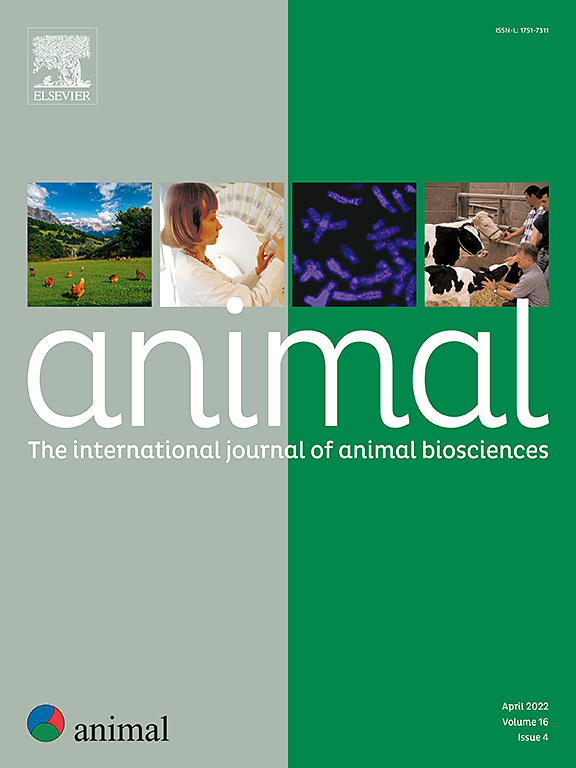Review: Will “cultured meat” transform our food system towards more sustainability?
IF 4
2区 农林科学
Q1 AGRICULTURE, DAIRY & ANIMAL SCIENCE
引用次数: 0
Abstract
Our agri-food system today should provide enough healthy food of good quality for the growing human population. However, it should also preserve natural resources and better protect livestock. In this context, some FoodTech companies are developing a disruptive approach: cell culture for in vitro food production of “meat” but this technology is still at the research and development stage. This article will highlight its development, the technologies used and the stakeholders involved (Part 1), its potential environmental impacts (Part 2) but also regulatory, social and ethical issues (Part 3). This article aims to shed light throughout the manuscript on two major controversies related to “cultured meat”. The first controversy is related to its ethical aspects, which includes different points: its potential to reduce animal suffering and therefore to improve animal welfare, the future values of our society, and a trend towards food artificialisation. The second controversy includes environmental, health and nutritional issues, in relation to the characteristics and quality of “cultured meat” with an important question: should we call it meat? These two controversies act in interaction in association with related societal, legal and consequently political issues. Answers to the various questions depend on the different visions of the World by stakeholders, consumers and citizens. Some of them argue for a moderate or a strong reduction in livestock farming, or even the abolition of livestock farming perceived as an exploitation of farm animals. Others just want a reduction of the current much criticised intensive/industrial model. Compared with other potential sustainable solutions to be implemented such as reduction of food losses and waste, new food consumption habits with less proteins of animal sources, sustainable intensification, development of agroecological livestock production, or the development of the market for other meat substitutes (proteins from plants, mycoproteins, algae, insects, etc.), “cultured meat” has an uncertain future.
回顾:养殖肉类 "能否改变我们的食品系统,使其更加可持续?
我们今天的农业食品系统应该为不断增长的人口提供足够的健康、高质量的食品。然而,它也应该保护自然资源,更好地保护牲畜。在这种背景下,一些食品科技公司正在开发一种颠覆性的方法:细胞培养用于体外食品生产“肉”,但这项技术仍处于研发阶段。本文将重点介绍其发展,所使用的技术和所涉及的利益相关者(第1部分),其潜在的环境影响(第2部分),以及监管,社会和伦理问题(第3部分)。本文旨在阐明整个手稿中与“培养肉”相关的两个主要争议。第一个争议与它的伦理方面有关,其中包括不同的观点:它有可能减少动物的痛苦,从而改善动物福利,我们社会的未来价值,以及食品人工化的趋势。第二个争议包括环境、健康和营养问题,与“培养肉”的特性和质量有关,其中一个重要问题是:我们应该称它为肉吗?这两个争议与相关的社会、法律和政治问题相互作用。各种问题的答案取决于利益相关者、消费者和公民对世界的不同看法。他们中的一些人主张适度或大力减少牲畜养殖,甚至废除被视为剥削农场动物的牲畜养殖。其他人只是希望减少目前备受批评的集约化/工业化模式。与其他可能实施的可持续解决方案相比,如减少粮食损失和浪费,减少动物来源蛋白质的新食品消费习惯,可持续集约化,发展农业生态畜牧业生产,或开发其他肉类替代品(植物蛋白质,真菌蛋白,藻类,昆虫等)的市场,“培养肉”的未来不确定。
本文章由计算机程序翻译,如有差异,请以英文原文为准。
求助全文
约1分钟内获得全文
求助全文
来源期刊

Animal
农林科学-奶制品与动物科学
CiteScore
7.50
自引率
2.80%
发文量
246
审稿时长
3 months
期刊介绍:
Editorial board
animal attracts the best research in animal biology and animal systems from across the spectrum of the agricultural, biomedical, and environmental sciences. It is the central element in an exciting collaboration between the British Society of Animal Science (BSAS), Institut National de la Recherche Agronomique (INRA) and the European Federation of Animal Science (EAAP) and represents a merging of three scientific journals: Animal Science; Animal Research; Reproduction, Nutrition, Development. animal publishes original cutting-edge research, ''hot'' topics and horizon-scanning reviews on animal-related aspects of the life sciences at the molecular, cellular, organ, whole animal and production system levels. The main subject areas include: breeding and genetics; nutrition; physiology and functional biology of systems; behaviour, health and welfare; farming systems, environmental impact and climate change; product quality, human health and well-being. Animal models and papers dealing with the integration of research between these topics and their impact on the environment and people are particularly welcome.
 求助内容:
求助内容: 应助结果提醒方式:
应助结果提醒方式:


